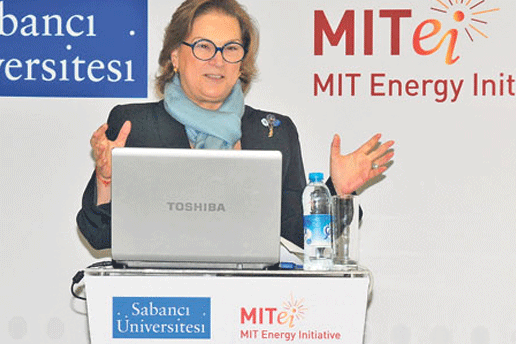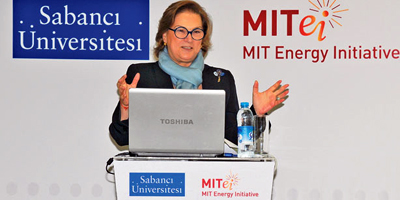
The Massachusetts Institute of Technology (MIT) and Sabancı University partnered up on Friday to establish an intensive cooperative program, “The MIT-Sabancı University Energy Security Initiative (MSESI),” to facilitate research, technically grounded analysis and information exchange and coordination between main players in the Turkish energy sector.

Sabancı Holding Chairwoman Güler Sabancı addresses participants at Friday’s program. (Photo: Today’s Zaman)
The Energy Security Workshop was held in İstanbul at the program’s launching ceremony. During the workshop the focus, scale, governance and funding of MSESI were discussed by the 30 key participants from MIT, Sabancı University, Harvard University and other players in the energy industry. MSESI will facilitate a limited number of highly selective research projects and will provide training, counsel to student and other educational opportunities, as well as student exchanges between the participant universities.
Güler Sabancı, chairperson of the board of trustees at Sabancı University, spoke at the event and said that the focus of MSESI will be to collect detailed data regarding the Turkey’s energy resources and take an inventory of Turkey’s human resources in the industry. The international partnership will also research the infrastructure in Turkey, to determine whether or not it can handle the predicted growth in the demand for energy. MIT Energy Initiative Director Ernest Moniz; Professor at MIT and Sabancı University John Deutch; Harvard University Professor Leonardo Maugeri; Turkish Petroleum Industry Association (PETDER) Chairman Ahmet Erdem, Sabancı Holding Energy group President Selahattin Hakman; and Michael Greenstone from MIT were present at the workshop sessions where regional energy issues in southern and eastern Europe, the south Caucasus, North Africa and the Middle East were discussed, as well as the impact of these issues on global energy challenges. Topics such as natural gas, oil and geopolitics, climate change and nuclear power were part of discussion sessions as well.
Referring to the nuclear incident in the Fukushima power plant in Japan that caused uncertainties over nuclear safety, Sabancı called for safety measures to be improved for the future of nuclear power. He said, “Conventional oil and gas resources, which constitute around half of Turkey’s primary energy supply, are largely located in a few regions and countries, but recent events in North Africa and the Middle East have had implications on the balance of the international demand and supply of oil.” She quoted International Energy Agency (IEA) Execute Director Maria Van der Hooven’s words: “In times of economic uncertainty, one aspect of energy policy remains a priority: energy security,” to emphasize that analyzing the challenges for energy security is vital to sustaining the growth of the world economy. Explaining that many things affect energy security, including energy production, transportation, storage and pricing, Sabancı stated that “these dimensions need to be addressed carefully to devise effective approaches to ensure timely access to sufficient energy at affordable and competitive prices.”
Noting the importance of launching MSESI, Sabancı said, “The world needs to invest $38 trillion in energy production before 2035 in order to meet the substantial global growth in demand for energy, mainly driven by emerging economies and it also must support steps for the development of functioning and competitive energy markets, as well as the establishment of stable legal and regulatory frameworks.” Sabancı called for further efforts in advancing the resilience of energy infrastructure — for the purpose of producing, transporting and storing oil and natural gas — in order to generate, transmit and distribute electricity from production to consumption. She said, “Furthermore, international cooperation is needed among countries, energy companies and other stakeholders to improve global energy security.”
The growth in global energy demand, climate change, resource competition and changing patterns, particularly for unconventionally extracted oil and natural gas, presents a new set of geopolitical and energy security challenges. Under current policies, the IEA forecasts a 47 percent increase in global energy demand by 2035, with non-OECD countries accounting for over 90 percent of that growth. In spite of policies to develop alternative, renewable sources of energy, fossil fuels will account for almost 80 percent of total energy consumption over the next 25 years. While new policies and a stringent climate policy could alter this trajectory, these measures come with their own set of global, regional and national challenges.